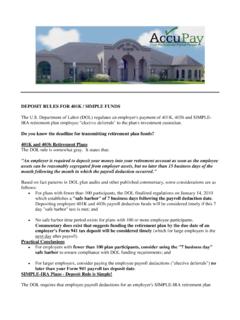Transcription of Will the IRS allow an S Corp to pay its owner …
1 s corp Pays zero salary to owner will the IRS allow an s corp to pay its owner - employee zero salary during its start-up phase when it earns little or no income or incurs a loss? The answer is yes, but .. The IRS sees the s corp zero salary strategy as one of its biggest hot buttons. This makes sense since S corps already serve as a payroll tax-saving device, because employee salary is subject to payroll taxes, but s corp distributions to shareholders are not. Therefore, to the extent the s corp pays the owner distributions instead of a salary , the owner can save big on payroll taxes. Unfortunately, many s corp owners have gotten greedy and had their corporations pay them zero salary , thereby avoiding all payroll taxes. In the year 2000, the IRS. Inspector General found that 440,000 one- owner S corps paid themselves no salary , costing the government billions in lost payroll taxes. As a result, the IRS. has stepped up enforcement on this issue and audited thousands of S corps that paid their owners little or no salary .
2 Big Penalties If the IRS determines that an s corp owner purposely attempted to evade payroll taxes by disguising employee salary as distributions, it can reclassify the distributions as salary and require payment of employment taxes plus penalties of up to 100% of the payroll tax plus negligence penalties. The IRS has ruled that it will pursue big penalties when it concludes that the corporation paid the owner - employee unreasonably low compensation for his or her services. Therefore, it would be wise to pay the owner - employee at least some salary - even if on the low end of the "reasonableness" scale. Start-Up S corps So, where does that leave the start-up S corps that earn little or no income or maybe even incur a loss? Do these S corps still have to pay owner -employees a minimal reasonable salary ? The short answer is "no", as long as the s corp makes no distribution to the owner - employee to avoid payroll taxes. The reality is that the IRS cannot require a business to pay its employees a minimum salary .
3 In a recent court case involving an s corp owner - employee , the IRS stipulated to the court that it did not have the authority to require the corporation to pay the sole shareholder- employee any particular minimum employee salary before it could pay him distributions. What the IRS Hates What the IRS primarily objects to, and has the authority to prevent, is an s corp making a tax-free distribution to an owner - employee for what is actually compensation for services provided. The IRS will not object to the S- Corp making zero payments to the owner employee when the business is earning little or no income. But, when the business is making money, it must first pay the owner - employee a reasonable compensation before making any payroll tax-free distributions with any excess funds. In Conclusion S Corporations can save substantial payroll taxes by setting owner -employees'. salaries "on the low side". But, the s corp needs to be able to justify that salaries paid to their owner -employees are "reasonable" in relationship to the value of services provided by the owner -employees.
4 One Final Thought Long-time readers of our PayDay's are aware that health insurance premiums paid by S Corporations on behalf of 2%+ shareholders must be reported as income (exempt from payroll taxes!) on the owner - employee 's W-2 form. (Read more here.)As such, the owner 's compensation reported and deducted on the S. Corporation tax return is increased in the amount of the owner 's health insurance premiums. These premiums "count" in determining whether an owner - employee 's salary is "reasonable" (a good deal!). PayDay is an email communication of payroll news, legal updates and tax considerations intended to inform clients and colleagues of AccuPay about current payroll issues and planning should consult with your CPA or tax or legal advisor before implementing any ideas, comments or planning techniques.










![Forms of Business Ownership[1] - Nevada SBDC](/cache/preview/f/2/d/5/2/0/f/a/thumb-f2d520fa3db64de8bc2e7dcba03e2b5b.jpg)
